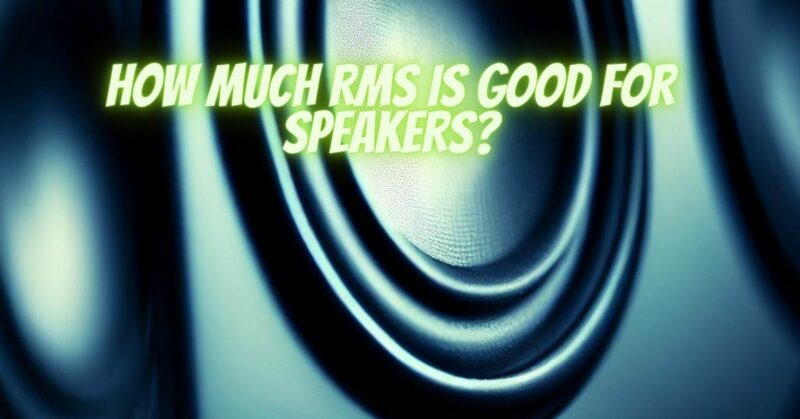RMS stands for root mean square, and it is a measure of the average power that a speaker can handle without being damaged. The amount of RMS that is good for speakers depends on a number of factors, including the size of the speakers, the type of music you will be listening to, and the desired listening volume.
In general, larger speakers can handle more RMS than smaller speakers. This is because they have a larger surface area and can move more air. Speakers that will be used for listening to loud music or for parties will need to have a higher RMS rating than speakers that will be used for listening to quiet music or for background music.
The desired listening volume will also affect the amount of RMS that is needed. If you want to be able to play your speakers at very loud volumes, you will need speakers with a higher RMS rating.
Here are some general guidelines for how much RMS is good for speakers:
- Small speakers: Small speakers, such as bookshelf speakers, typically have an RMS rating of 20-50 watts.
- Medium-sized speakers: Medium-sized speakers, such as floorstanding speakers, typically have an RMS rating of 50-100 watts.
- Large speakers: Large speakers, such as subwoofers, typically have an RMS rating of 100 watts or more.
It is important to note that these are just general guidelines. The actual amount of RMS that is needed will vary depending on the specific speakers and the desired listening conditions.
If you are not sure how much RMS you need, it is always best to consult with a professional audio technician. They can help you choose speakers that have the right amount of RMS for your needs.
Here are some additional things to keep in mind when considering how much RMS is good for speakers:
- Peak power: The peak power rating of a speaker is the maximum amount of power that the speaker can handle for a short period of time. The RMS rating is more important than the peak power rating when choosing speakers, as the speakers will be operating at their RMS rating most of the time.
- Clipping: Clipping is a type of distortion that occurs when an amplifier is unable to provide enough power to the speakers to reproduce the audio signal accurately. This can cause the speakers to produce unwanted sounds, such as buzzing or crackling.
- Overheating: If the amplifier is providing more power than the speakers need, it may overheat. This can damage the amplifier and the speakers.
By understanding these factors, you can better determine how much power you need to provide to your speakers.
Ultimately, the best way to determine how much RMS is good for your speakers is to listen to them yourself and compare them to speakers with different RMS ratings.


